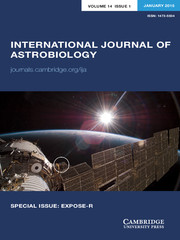Crossref Citations
This article has been cited by the following publications. This list is generated based on data provided by Crossref.
Crawford, Ian
2018.
Big history and the cosmic perspective.
Astronomy & Geophysics,
Vol. 59,
Issue. 5,
p.
5.33.
Christie, James E.
2019.
From Influence to Inhabitation.
Vol. 228,
Issue. ,
p.
171.
Lupisella, Mark
2020.
Cosmological Theories of Value.
p.
195.
Lingam, Manasvi
and
Loeb, Abraham
2020.
What's in a name: the etymology of astrobiology.
International Journal of Astrobiology,
Vol. 19,
Issue. 5,
p.
379.
Chon-Torres, Octavio A.
2020.
Astrobioethics: a brief discussion from the epistemological, religious and societal dimension.
International Journal of Astrobiology,
Vol. 19,
Issue. 1,
p.
61.
2020.
Biological Chirality.
p.
137.
Peters, Ted
2021.
Astrobiology.
p.
17.
Crawford, Ian A.
2021.
Expanding Worldviews: Astrobiology, Big History and Cosmic Perspectives.
Vol. 58,
Issue. ,
p.
341.
Moynihan, Thomas
2021.
Expanding Worldviews: Astrobiology, Big History and Cosmic Perspectives.
Vol. 58,
Issue. ,
p.
65.
Crawford, Ian A.
2021.
Astrobiology.
p.
313.
De Mol, Maarten L.
2023.
Astrobiology in Space: A Comprehensive Look at the Solar System.
Life,
Vol. 13,
Issue. 3,
p.
675.
Whittet, D
2024.
Astronomy, society and sustainability: how we can help to save the planet.
Astronomy & Geophysics,
Vol. 65,
Issue. 6,
p.
6.12.


